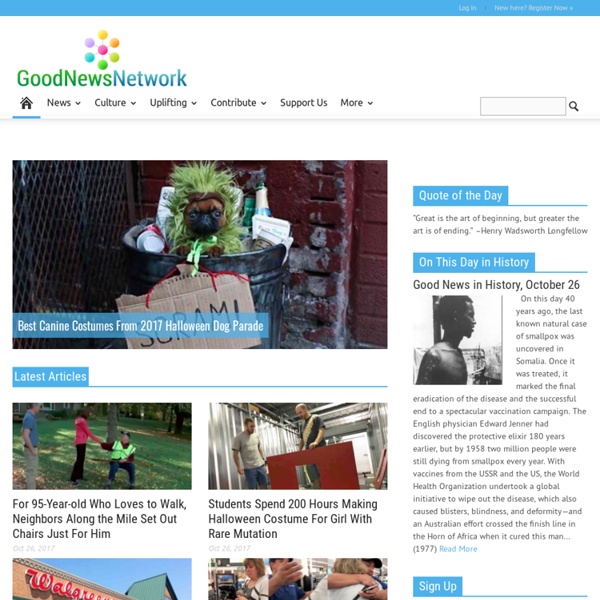



http://www.goodnewsnetwork.org/
Related: Hobbies • English Lesson • Fact Checking Media and Helpful News SourcesZen and the art of torso maintenance: Matthew McConaughey's guide to life The biggest question in the universe, writes Matthew McConaughey in his new autobiography (of sorts) is “WHOWHATWHEREWHENHOW?? – and that’s the truth. WHY? is even bigger.” With Greenlights, his love letter to livin, McConaughey attempts to answer these questions and others, such as why he never puts a “g” on the end of “living” – “because life’s a verb”. Greenlights is not a memoir, though it tells true stories from his life in chronological order.
Living plastic-free: One activist fights a rising tide of pollution Breaking News Emails Get breaking news alerts and special reports. The news and stories that matter, delivered weekday mornings. Feb. 16, 2019, 3:12 PM GMT / Updated Feb. 22, 2019, 10:56 PM GMT Misinformation, Data Literacy and the Novel Coronavirus Teach students how to identify misinformation and stop its spread. The outbreak of COVID-19 (also called the “novel coronavirus”) is likely to be front-of-mind for you and your students right now. In this rapidly evolving situation, lots of information, misinformation, and rumor have been circulating on social media and the news, which your students may be struggling to sort through and evaluate. This can cause them to feel anxious, fearful, and confused.
The Scandinavian way to tackle winter - BBC Reel BBC Reel goes beyond the headlines to see how the Nordic countires are getting their work-life balance correct. How to hack winter like a SwedeThe idea of 'friluftsliv' is a popular way for people in Nordic countries to keep happy during the wintertime.Now Playing Why the Swedes love paying their taxesSweden has some of the world's highest taxes, so why is the taxman so popular with the Swedes? HumansThe Nordic queen with freedom to roamSweden celebrates the right to roam in the country’s nature, and women embrace the tradition alone.Watch now
Cooperative Learning: 7 Free PDF Assessment Instruments Introduction There are numerous ways to evaluate the outcomes of cooperative learning, and fortunately enough, none of them require an enormous investment of time. As you would do with other evaluations, begin by deciding what it is that you would like to examine, and then choose the best tool with which to assess it. Is it the success of individual student effort, the success of the groups themselves, or is is it the extent of the acquisition of knowledge that’s most important to discover? I’m thinking that an evaluation of all three of these aspects, at least to some degree, would yield valuable insights to shape your future efforts. But, how do you proceed, and more importantly, how much time will this consume?
Fake animal news abounds on social media as coronavirus upends life Scattered amid a relentless barrage of news about COVID-19 case surges, quarantine orders, and medical supply shortages on Twitter this week, some happy stories softened the blows: Swans had returned to deserted Venetian canals. Dolphins too. And a group of elephants had sauntered through a village in Yunnan, China, gotten drunk off corn wine, and passed out in a tea garden. These reports of wildlife triumphs in countries hard-hit by the novel coronavirus got hundreds of thousands of retweets. Why our dreams could be the key to time travel - BBC Reel Exploring the latest understanding of why we sleep and what we dream and what effect this has on us. Could your dreams predict the future?Have you ever gone to sleep and had a dream about something, only for it to then actually happen in reality?Now Playing The link between sleep and memory lossCan we manipulate our sleep to improve cognition and health?
20 interactive teaching activities for in the interactive classroom Interactive teaching is all about instructing the students in a way they are actively involved with their own learning process. There are different ways to create an involvement like this. Most of the time it’s through News Literacy Resources for Classrooms A best-of-the-best collection of resources for teaching and learning about news literacy. News literacy is a subset of media literacy focused on helping people process and understand news media messages, to locate more factual and credible information, and to think critically about what counts as news. News literacy is also about recognizing that quality, credible, independent news and journalism are critical components of any free and democratic society.
Long Weekend in Baku In the final of a series of guides on the Caucasian capitals, our ever-roving reporter Stuart Wadsworth introduces us to Baku, an oil-rich boomtown on the Caspian sea. Baku, capital of Azerbaijan, the most populous of the three Caucasian capitals with around two million inhabitants, has come a long way since the unlamented collapse of the U.S.S.R. After coming through a bitter war with Armenia (over Nagorno Karabach – which they lost) and an internal power struggle in the 90’s it is now run effectively, if somewhat undemocratically, by the self-appointed Aliyev dynasty – who don’t so much govern Azerbaijan, as own it.